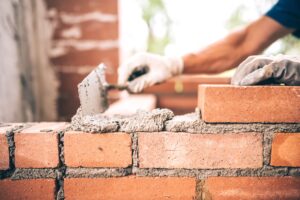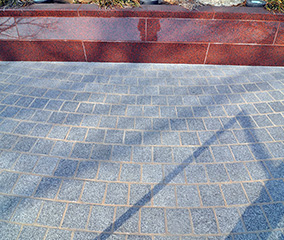
Which mortar is most effective for your masonry work?
Mortar is the essential binding agent that holds masonry structures together, ensuring strength, durability, and longevity. However, not all mortar is created equal. For it to be effective, it must possess key properties that influence workability, bonding ability, and drying time. Let’s explore the fundamental properties of high-quality mortar and why they matter in the projects DelPrete Masonry completes.
Workability: The Key to Smooth Application
One of the most crucial properties of mortar is its workability—the ease with which it can be mixed, applied, and shaped. A workable mortar should:
- Spread smoothly and easily with a trowel
- Support the weight of bricks, blocks, or stones
- Adhere well to masonry surfaces
- Squeeze out slightly when pressure is applied to the masonry units
If mortar is not sufficiently workable, it becomes difficult to apply, leading to an inconsistent structure. Proper workability ensures a smoother and more efficient masonry process.
Bond Strength: Holding Everything Together
Once the mortar hardens, its bond strength becomes essential. Poor bonding can lead to separation between masonry units, causing structural weakness over time. Bonding is measured by:
- Extent-of-bond – The amount of contact between the mortar and masonry unit
- Bond strength – The stress required to break the bond between the two materials
A strong bond ensures a durable and stable masonry work, preventing cracks and displacements in the masonry.
Stiffening Rate: Finding the Right Balance
The stiffening rate refers to how quickly mortar begins to lose moisture and harden. This rate plays a vital role in the masonry construction process:
- A high initial stiffening rate helps maintain project efficiency
- A slow stiffening rate can cause the mortar to squeeze out over time, leading to uneven joints
- A stiffening rate that is too fast may cause cracking and weakened masonry
Climate conditions, material composition, and project specifications all influence the ideal stiffening rate for mortar.
Choosing the Right Mortar for Your Project
Selecting mortar with the right workability, bond strength, and stiffening rate is essential for successful masonry work. Whether you’re working on new construction or restoration, using high-quality mortar ensures better results and prevents costly repairs down the line.
If you need expert masonry guidance or services, contact DelPrete Masonry for professional assistance in selecting and applying the best mortar for your project.
CONTACT DEL PRETE MASONRY TODAY!
Whether you are ready to start your next masonry project or are still hesitant and have questions, Del Prete Masonry is here to help. We have the experience and expertise to get it right the first time. Questions? Want to visit some of our residential or commercial projects? Ready to set up a consultation? Feel free to give us a call at 410-683-0650 or visit us online. We are happy to serve Baltimore City and County, Harford County, Carroll County, Anne Arundel County, and Howard County. To see examples of our work and to keep up with our new and exciting projects, be sure to follow us on Facebook, Twitter, and Pinterest.
Tags: brick masonry, masonry construction, mortar





























